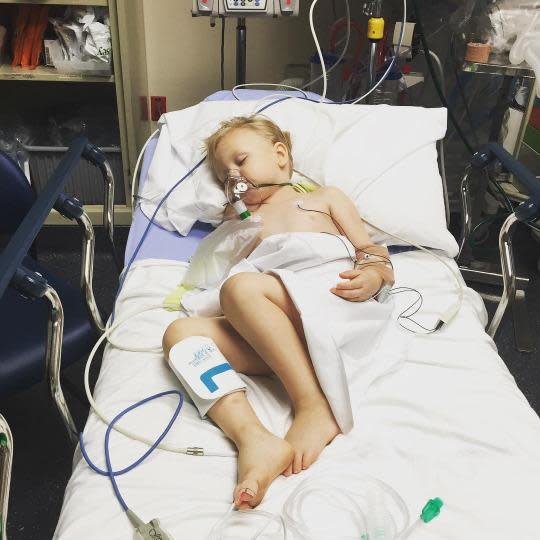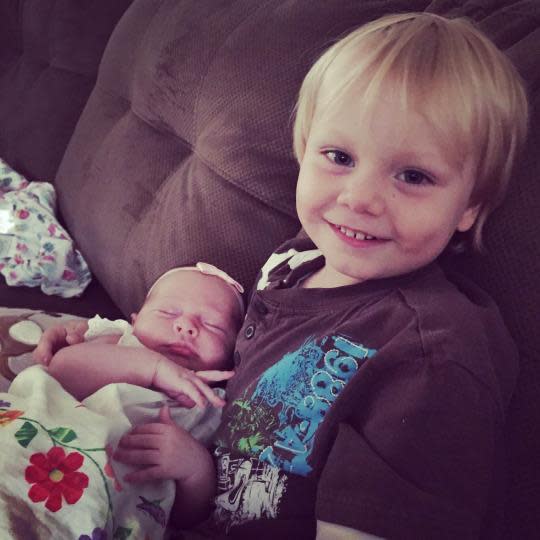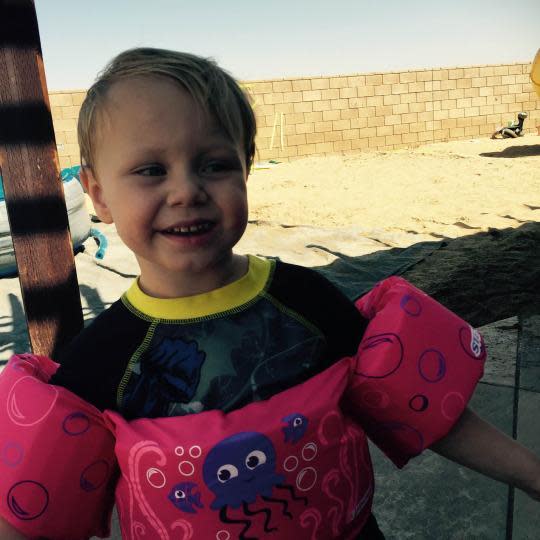Mom Shares Photo of 3-Year-Old Son After Dry Drowning Scare

“People think that something like this won’t happen to you, but it can,” Darcy McQueeney tells Yahoo Parenting about nearly losing her son, Ezra Coleman, 3, to drowning — hours after he was pulled from a pool. “It’s so easy.” (Photo: Facebook, Darcy McQueeney)
It’s every parent’s nightmare: thinking your child has escaped danger only to discover that the worst is yet to come. That’s what happened to Darcy McQueeney, whose son, Ezra Coleman, 3, appeared be fine following a pool accident on Aug. 14 — slipping underwater for less than 30 seconds — but then became unresponsive and in life-threatening danger nearly four hours later. “Suddenly, he just changed,” the Lancaster, Calif., mother of two tells Yahoo Parenting. “His whole body changed — his eyes glazed over, his hands started twitching. He was crashing.”
STORY: ‘Hero’ 12-Year-Old With Down Syndrome Saves Sister From Drowning
McQueeney’s photo of the heart-stopping moment in the hospital has been shared more than 80,000 times on Facebook, where she posted it as a warning to parents about the overlooked dangers of drowning.
“Please take a good look at this photo,” she wrote on Aug. 15, a day after the accident. “He only went under for less than thirty seconds. He was being watched by two sober, conscientious adults who were both less than ten feet away in a gated pool. … That small blip of time was all it took for him to inhale water.” Marveling at how he was “talking and even eating after the incident,” she adds that he “went downhill hours later” and is “incredibly lucky … to be alive.”

Ezra Coleman with his 2-month-old sister. (Photo: Darcy McQueeney)
The preschooler certainly didn’t seem to be in grave danger after the mishap, which took place at around 6 p.m. at a friend’s house. McQueeney tells Yahoo Parenting that Coleman had been swimming with his floaties on in the pool, then had gotten out and taken them off. While an adult watching him turned away to grab him a towel, the 3-year-old decided to jump back into the water, forgetting that he wasn’t wearing the swim aids.
STORY: Dog Saves Dad’s Life as He Begins to Drown in Front of Sons
Adults in the pool who saw him initially thought he still had the flotation aids on because they were the same blue color as his swim shirt. As soon as it was clear he was in trouble, less than half a minute later, the mom says that an adult grabbed him from the water. “Ezra was never unconscious,” explains McQueeney, a seventh- and eighth-grade special education teacher. “He coughed up a lot of water and said that his chest hurt, but he was talking the whole time.”
The mom recalls that she had heard about what’s typically called “dry drowning” or “secondary drowning,” in which individuals experience the effects of drowning hours after exiting the water. But she couldn’t remember what the warning signs were. A medic friend at the party encouraged her to observe Coleman for an hour before deciding whether he was truly OK.
The boy ate dinner but kept nodding off, which McQueeney said wouldn’t normally be a red flag for kids his age, considering he hadn’t taken a nap and had been active all day, and that it was nearing bedtime. “But I knew in my gut something was wrong,” she said. “I couldn’t keep him awake — and when my son gets tired, he bounces off the walls. When he started coughing more, I was like, ‘We need to take him to the hospital.’”
At the ER though, she recalls, “Everybody looked at us like, ‘He seems fine.’” Nevertheless, doctors monitored his oxygen level and kept him in a room under observation. “The whole time there he was really lethargic,” she says, noting that Coleman’s oxygen levels kept fluctuating. “So we were just sitting there talking about how we hoped they’d let us go.” Then, suddenly, at 10 p.m., everything changed.
McQueeney says her son’s oxygen levels tanked and that she yelled for help. “It was like he was there but not there,” she says of Coleman, whose eyes glazed over and then closed as he fell unresponsive. He was rushed to a trauma room and given a bag of oxygen and then, she says, “Two hours later he was fine. It was the craziest thing.” The boy, his mother now knows, was in the process of drowning due to the water still sloshing around in his lungs. “If we hadn’t gone to hospital,” she says, “he could have died or had brain damage.”
The mom “did everything absolutely correct,” Starfish Aquatics Institute medical director Justin Sempsrott, MD, tells Yahoo Parenting. “Her son drowned, plain and simple. He had a mild, nonfatal drowning. Drowning is a process, not an outcome.” Likening it to the description of heart attacks, Sempsrott says the spectrum of drowning ranges from mild to severe, noting that mild cases of drowning are quite common.
“The most mild form of drowning is when you’re sitting at the dinner table drinking tea and it goes down the wrong pipe,” he says. “You immediately start coughing and gasping to get it up and out. Normally, you’re successful. But imagine you’re in a pool and a larger amount of water goes in and doesn’t come out.” It can take a person up to 24 hours to recover from water pooled in his or her lungs, he says. “So anyone coming out of the water coughing and gasping I recommend go to the ER.” Mostly, they will be OK, he says. But if you don’t seek help to make sure that the person is getting oxygen, things could “progress to a point that the drowning victim is too exhausted from their injury to even cough, and their injury could continue to get worse to the point that they’ll have such difficulty breathing, the body will not be able to get oxygen, and the person will stop breathing.”
Even if you call 911, Sempsrott says, you’re “racing against the clock” at that point. And every second that the brain is without oxygen is critical. “Brain damage can begin in four to six minutes,” he says. “Ten minutes is enough to cause death and irreversible brain damage.” And it’s impossible to know from just looking at a person who will get better on his or her own and who won’t. But Sempsrott is quick to caution that drowning “is not a mysterious syndrome in which you pull your kid out of the water and he’s acting normal, then after a nap they die.”
The reality, he says, is that drowning victims show symptoms as soon as you get them out of the water. A few to look out for: excessive coughing, inconsolable crying, vomiting, diaper accidents, a weak cry, or irritability and excessive sleepiness. “Basically, if at any time over the next eight hours he or she isn’t acting right, you need to take the person to the ER,” which is just what McQueeney did with her son.

Ezra in his new flotation aid. (Photo: Darcy McQueeney)
Today, the mom tells Yahoo Parenting that Coleman is doing fine and has gotten back in the water, outfitted in a new swim vest, and will be starting swim lessons soon. She, however, is still having some trouble brushing off her boy’s near-death experience. “I don’t even want him to take a bath now,” she admits. “When kids are around water, there’s always a risk. People think that something like this won’t happen to you, but it can. It’s so easy. It doesn’t matter how closely you’re watching them — it can happen in a second.”
McQueeney, who also has a 2-month-old daughter, adds, “I was afraid to be the mom who rushes to the ER for no reason. But imagine if I had been by myself and he was going without oxygen for a long time as I was waiting for an ambulance? There’s a lot of ways this could have gone really wrong.”
She posted Coleman’s hospital photo to show other parents how important it is to take water safety seriously. “We know not to leave our kids unattended,” she says. “We know that pools should be gated. We use the flotation devices designed for kids. What most parents don’t know is that even after taking precautions, when these accidents happen, kids are still in danger even after being pulled from the water fully conscious.”
Regarding when her son became unresponsive, she says, “I’ll never forget the panic of looking at his sweet face and realizing that I could lose him. Had we not been in a hospital, I very well could have. I want people to be aware that even if someone seems OK after an accident in the water, they may not be.”
Please follow @YahooParenting on Facebook, Twitter, Instagram, and Pinterest. Have an interesting story to share about your family? Email us at YParenting (at) Yahoo.com.

